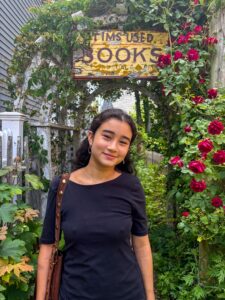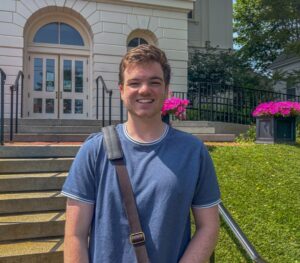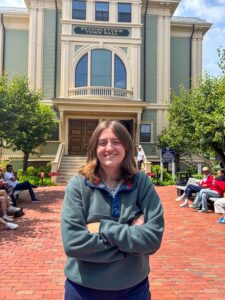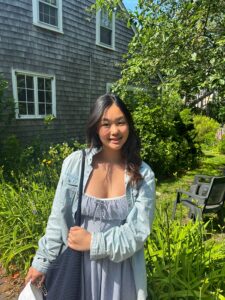The Provincetown Independent’s four summer fellows, supported by the Local Journalism Project, have arrived and will be working at the newspaper through mid-August. We invited them to introduce themselves on these pages. —The Editors
Bringing People Into Focus
By Chloe Budakian
From Waterloo, Ontario
Yale University, Class of 2027
History
Driving to Provincetown from New Haven at the end of last week, I felt like I hadn’t really left school.

My mind was still on the question of how to report on the government’s assault on higher education. Or at least on Yale.
I am a rising junior majoring in history, though I am taking enough literature classes that I consider myself an English major. I am also the co-editor-in-chief of the New Journal, a publication I have admired since my first days of college when I picked up an issue in the dining hall and read it cover to cover.
From my phone’s speaker, I listened as fellow editors went back and forth. We were trying to wrap our minds around what will happen to international students, especially recent admits, between now and September.
At the same time, I was also trying to wrap my mind around the directions Google Maps was giving me. That robot, to my frustration, has not yet learned to wait its turn before speaking.
“Does the data on canceled researcher grants include ….”
“In one-point-five miles turn left.”
“What is going to happen to financial aid if ….”
“Turn left on Shank Painter Road.”
Just like my drive to Provincetown, much of the past few months has involved juggling regular life and the latest news about what is happening to higher education. I was walking back from dinner, leftover pizza in hand, when a friend called to say that the administration had halted visa interviews for international students. I was taking a nighttime hike (and sporting my unfashionable headlamp) when I remembered I was supposed to be on a call about the U.S. House’s recently passed legislation proposing to raise the taxes of private university endowments from 1.4 percent to 21 percent.
Because the New Journal comes out only five times a year, we struggle to predict which stories we’re pursuing now will still be relevant to our readers come September, when we publish next. We only know that the relationship between national news and what will happen at school is unclear, and that we want to bring it into focus.
I wonder if things will be very different at the Independent, and for local journalists across the United States for that matter, in the months ahead.
I could not be more grateful to join the Independent’s team for 10 weeks. I’ve admired the news reporting but also the arts desk and the many wonderful profiles I’ve found while hunting through the Indie’s website. I plan to soak up all the Outer Cape arts and culture that I can and hope for a chance to write about people — whether they’re characters everyone knows or not.
That push-and-pull between what is known and not known is what draws me to journalism. Last summer, I wrote a story about Margaret Holloway, a New Haven street poet and graduate of the Yale School of Drama who died in 2020. Holloway had been the subject of some media attention. People knew her as someone who struggled with schizophrenia, but spending full days in Yale’s archives I found another story — of her early life and artistry. I also learned how elusive a life story can be.
I look forward to a summer of research, interviews, and stories — to showing up, even if I have to let the Google Maps robot lady guide me there.
Not Afraid of National Politics, but No Planes, Please
By Samuel A. Church
From Austin, Texas
Harvard University, Class of 2027
Social Studies
I began my journey to Cape Cod with anxiety pills and terrified prayers — but unlike many of my international classmates at Harvard, my fear of flying has nothing to do with the man in the White House.

Covering the college administration for The Crimson, the school’s newspaper, I have had a front-row seat to President Donald Trump’s attack on higher education. Since February, email notifications have become our bat-signals, mobilizing student reporters in a flurry toward our cramped newsroom. We immediately drop whatever we’re working on to call lawyers and chase statements and hope they’re not too overwhelmed to respond.
My nights have been spent in crowded dining halls, hearing students’ tales of canceled summer plans and decisions to spend June inside musty dorms out of an abundance of caution rather than traveling home. Even while I write this, my phone’s ringer is on full blast as I wait to hear whether an incoming student from the Middle East can obtain a visa necessary to attend Harvard amid a minefield of restrictions.
Though my reporting experience had been limited to the Harvard bubble, since moving to Provincetown last week I have realized that no one has been left untouched by changing national politics. Whether it’s art programs that rely on federal funding or small businesses grappling with staffing shortages, every national policy also resonates locally.
This is why we need papers like the Independent: laws may just be ink on a page, but they shape the narratives we live. And part of the point is to ensure these stories are preserved in the historical record.
My foray into journalism began in 2023, when I decided I wanted to take up the pen to tell the stories of my peers. I became the student organizations reporter, which entailed covering events like the launch of the “Vote Socialist” initiative as well as talking with the hacker who stole a list of students’ responses to a questionnaire that was part of Harvard’s Valentine’s Day matchmaking service — which, among other things, asked about their more risqué life experiences.
Reporting on the intersection of law, school administrators, and students is a more serious matter and more urgent than ever. These everyday interactions are quietly reshaping the foundations of higher education and civic life beyond the campus gates.
Before dipping my toes into journalism, I was, in my older sister’s words, a “huge nerd.” When I was not re-reading Dan Brown’s Angels and Demons, I was competing in high school and college policy debate, arguing about Chevron Deference or the value of America’s nuclear arsenal at over 350 words per minute.
This summer, I am excited to scratch my investigative itch by writing about the people of Provincetown. I have never explored Massachusetts outside my time in Cambridge, let alone been to the Outer Cape. I can’t wait to try my first lobster roll and take the ferry for the first time.
While the Cape is shaping up to be quite different from my home in Texas, where the summer air is roasting hot and smells like barbecue, I am excited to learn what this place is all about. While I came to report on the towns, I am excited to stay for the people — and also because I really do not want to get on another plane.
Seeking Historical Secrets and Eccentric People
By Anna Salvatore
From Pennington, New Jersey
Princeton University, Class of 2025
History and Journalism
My unruly teenage years were spent covering the U.S. Supreme Court from my bedroom in Pennington, N.J. As founder and editor of High School SCOTUS, a blog devoted to the federal judiciary, I translated opinions and oral arguments into plain English for an audience of students, teachers, and other journalists. It was challenging work. To explain something, it turns out that you need to understand it.

Once enrolled at Princeton, I made myself at home in our journalism program. If my interviews had once taken place over the phone, they now happened in laundromats and canvassing stations. And if my subjects had once been lawyers and legal journalists, they now included human rights workers in Ukraine and formerly incarcerated men in Philadelphia. These courses introduced me to wonderful characters who had little to do with the white-shoe world of appellate law.
My favorite assignment was to write about a historical secret. Thanks to the Princeton & Slavery Project, I learned that someone named “D. Leavitt” had offered $1,000 to Princeton University in October 1835 if it would admit students “irrespective of color” and grant them “like privileges.” Nearly 200 years later, scholars knew little about this man. In the archives at Princeton’s Mudd Manuscript Library, I learned that Leavitt was a banker and abolitionist whose barn in Great Barrington was the largest in New England. He made his offer just a month after Princeton students had attacked a local abolitionist, screaming, “Kick him out of town!”
It has already been my honor and pleasure to join the Independent as a summer fellow. If you know any delightful eccentrics who deserve a profile, I hope you will let the newspaper know. I want to write those stories.
The editors asked us what it’s like at college these days. At Princeton, as at other schools, eyes are turned to Washington. The federal government announced this spring that it would suspend more than $200 million of research grants to Princeton, a decision that came as little surprise to students and faculty amidst the Trump administration’s broader attack on Ivy League universities. According to my colleagues at the Daily Princetonian, these grants came from agencies including the Dept. of Energy, NASA, and the Defense Dept. Among the cuts was a climate science program that modeled ocean and atmospheric changes.
The university’s president, Christopher Eisgruber, had previously kept a low profile in the national news, known more for his constitutional law scholarship than his public pronouncements. Even Princeton students feel that they do not know him well. Recently, however, he has taken a public stand against the administration’s efforts to regulate and defund research at American universities. Apart from Wesleyan’s Michael Roth, he has been the most outspoken college president in the country.
“The funding that is essential to the quality of American research and America’s universities is under threat,” Eisgruber told the Daily in April. “That’s a crisis for universities, and it is a crisis for our country.”
He sounded a similar note in his commencement address in May. In a speech laden with references to the French philosopher Alexis de Tocqueville, he told graduating seniors and their families that Princeton must “stand boldly for the freedoms and principles that define this and other great universities.”
In caps and gowns, hundreds of students clapped for this mild-mannered man, and then, as if each one of us had made the decision simultaneously, we rose from our seats.
Starting to See the Power of Place
By Grace E. Yoon
From Vestal, New York
Harvard University, Class of 2027
Economics and English
From the moment I arrived in Provincetown, I was taken by its vibrancy. Walking along Commercial Street, I stopped every 10 steps to marvel at the houses. One had a figurehead of a woman with curly brown hair wearing a flowy blue dress jutting out of the roof. Another had a statue of a small dog named Nelly, frozen mid-howl, its snout tilted towards the sky.

The eccentric yet charming houses of Provincetown were qualities that already seemed to be reflected in the people that inhabited the place. Standing underneath the thick green vines and wild bursts of pink and purple flowers in Suzanne’s Garden, I learned that the carefully kept arbor hosted weddings, first dates, and — almost — a cigarette commercial, a prospect that Suzanne adamantly opposed.
I grew up in a small town, Vestal, N.Y., so the stillness of the Outer Cape feels familiar. Strolls I go on through the streets of Wellfleet, surrounded by trees, weathered fences, and overgrown wildflowers, mirror the walks I’ve taken in Binghamton University’s nature reserve, near where I’m from. The chorus of birds that stop by at my host’s feeder each morning sound just like the robins that would perch on the trees outside my window.
In my hometown, there isn’t much to do, but I found no shortage of things to fill my time. I played chamber music with friends on my cello, which I affectionately call Jamie, or took photos on a camera that I named Tammy. In retrospect, it seems that naming inanimate objects is another hobby of mine.
The Independent is the second newspaper I’ve had the opportunity to work for. At Harvard, I joined The Crimson — first on the housing and affordability beat. That’s how I first began to see Cambridge not as a college town but as a community. I’d sit through contentious arguments on whether to abolish single-family zoning to create more affordable housing at the Monday city council meetings. Other days, I walked across Central Square and spoke to the city’s unhoused population, learning the faults of the shelter system and gaps in support that leave many without a place to live. Quickly, the city became a place I cared about.
Now I cover Harvard’s administration as it navigates two lawsuits against the government. I’m learning to cover stories where institutional power, political pressure, and personal stakes collide.
When President Alan M. Garber announced that he would defy the Trump administration’s demands, Harvard became a symbol of resistance in higher education. The move also drew the ire of the White House. Day after day, Harvard received notice of additional funding cuts, Congressional investigations, and now, threats to international student enrollment.
In the flood of breaking news, I see how reporting demands urgency and clarity amid chaos. But stepping back from the rush of news at school, working for the Independent has reminded me of the quieter but equally vital questions: How is the news affecting people? Who gets left behind when things change?
While I’m staying on the Outer Cape for a mere 10 weeks, I want to immerse myself. Maybe there is nothing as conducive to journalism as to learn a place and write about its people.
People say reporting is a compass for our future, but I think it’s just as important as a way to capture the present. This summer is one I hope to spend slowing down — learning deeply, listening closely, and seeing this place a little more clearly.
